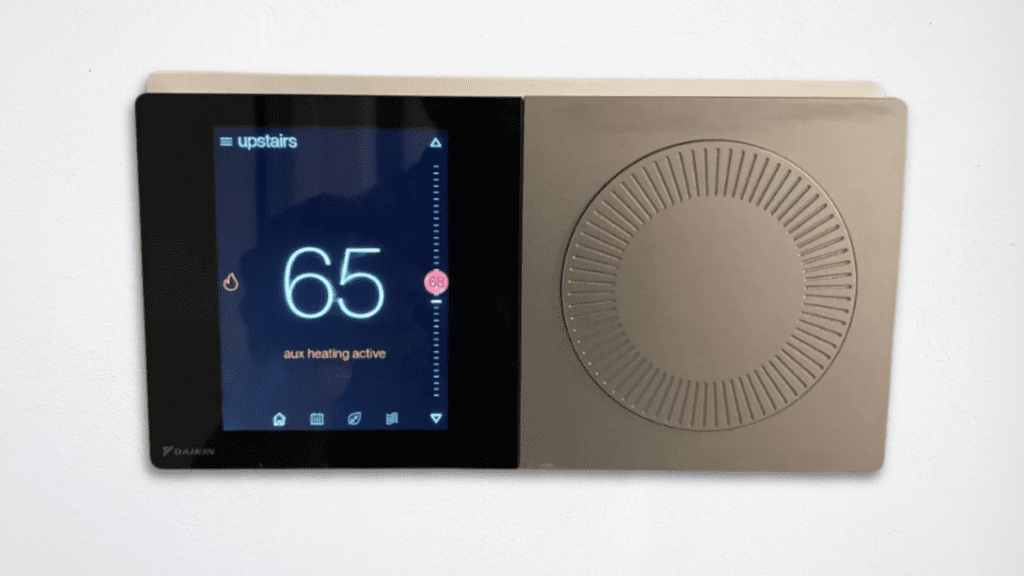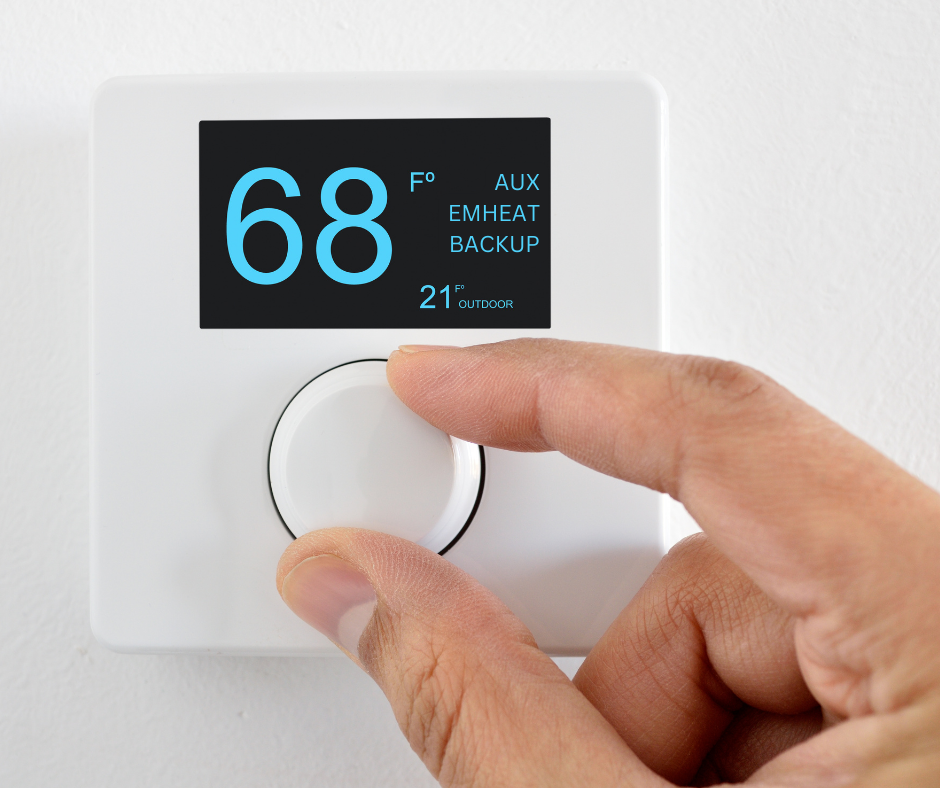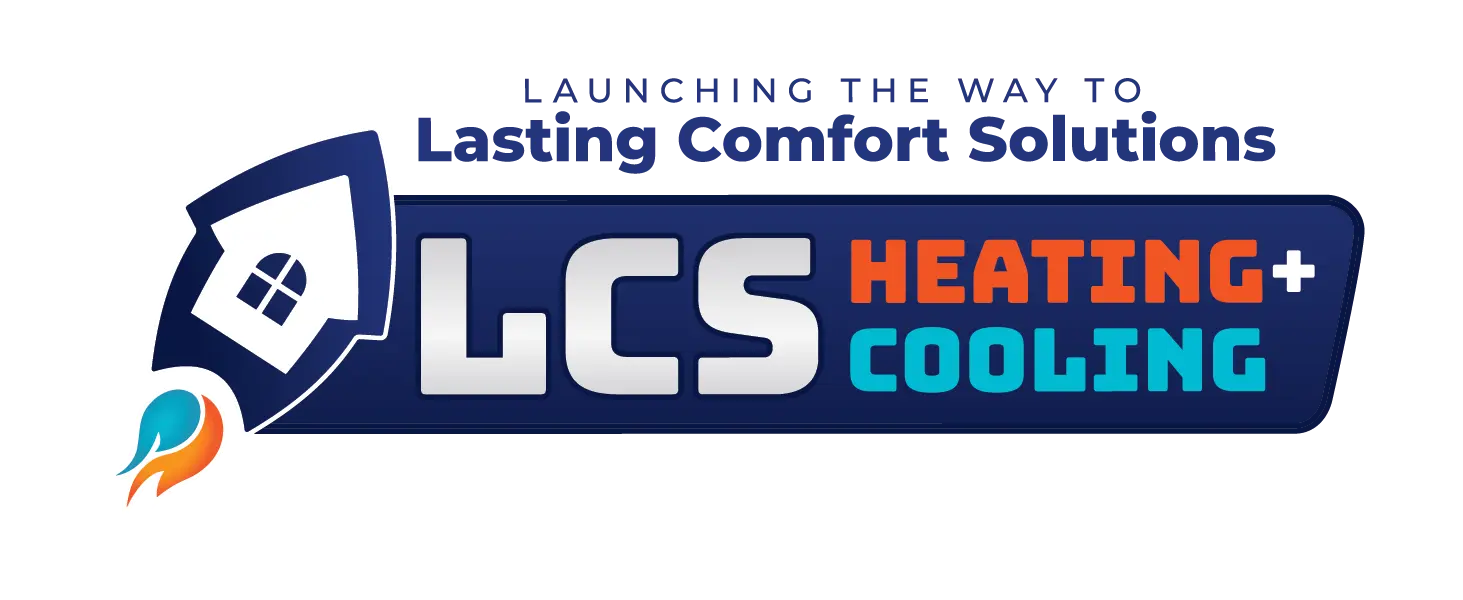Decoding HVAC Jargon: Emergency Heat, Auxiliary Heat, and Backup Electric Explained!
When temperatures drop, we understand the importance of a reliable heating system to keep you warm and cozy. But have you ever scratched your head trying to figure out the difference between emergency heat, auxiliary heat, and backup electric in your HVAC system? Don't worry, you're not alone! We’re going to break it down in simple terms to help you make smart choices this winter.
Auxiliary Heat: The Trusty Sidekick
 First, let's talk about auxiliary heat – the trusty sidekick to your electric systems that are heat pump and electric furnace. In most cases, auxiliary heat works alongside your heat pump to provide that extra boost when needed. Think of it as your HVAC system's way of saying, "I've got your back!"
First, let's talk about auxiliary heat – the trusty sidekick to your electric systems that are heat pump and electric furnace. In most cases, auxiliary heat works alongside your heat pump to provide that extra boost when needed. Think of it as your HVAC system's way of saying, "I've got your back!"
Standard heat pumps are efficient down to about 35 degrees outside. When it gets colder than that, they have a hard time keeping up on their own, so the electric furnace kicks in to assist. This furnace uses electric resistance coils to help maintain your desired indoor temperature. The colder it gets outside, the more the electric furnace runs to assist. While the electric furnace is running, some thermostats will show AUX.
Auxiliary heat is not efficient, however, so expect utility bills to be higher when it's really cold outside. However, this is some potential relief in sight: more efficient heat pumps called cold climate heat pumps have been developed more recently. They are efficient down to about 5 degrees outside, utilizing less backup electric from your electric furnace. This is great news for your utility bills!
Emergency Heat: Your HVAC Superhero
Imagine this scenario: it's the coldest night of the year, and your heating system is working overtime to keep up. Suddenly, something goes wrong—your heat pump struggles. Emergency heat to the rescue!
Emergency heat is a superhero because if a heat pump breaks down, you can use it to generate heat in your home. Keep in mind that switching the thermostat to emergency heat should only be done if you know the heat pump is not working properly. Like auxiliary heat, emergency heat can be expensive to run if your home is fully electric, so you'll want your heat pump checked out immediately.
Overall, in Indianapolis where winters can yo-yo from mild to downright harsh, having a reliable emergency heat source, like a gas furnace, ensures your home stays warm and toasty even on the coldest nights.
Backup Electric: Another Name for the Same Option
Last but not least, let's talk about backup electric. This feature is like the contingency plan in case your primary heating source experiences a hiccup. For example, if your heat pump malfunctions, backup electric heat strips can step in to keep things warm while you schedule a repair.
While backup electric heat is a reliable Plan B, it's essential to use it sparingly. Electric heating can be more expensive than other options, so consider it your safety net rather than your go-to heating source.
The Difference
 So what’s the real difference between these three? In case you haven’t figured it out yet, emergency heat and auxiliary heat are technically the same thing: with both, your electric furnace is providing heat. However, with auxiliary heat, the electric furnace is assisting your system. In emergency mode, the electric furnace is running alone because the heat pump is locked out.
So what’s the real difference between these three? In case you haven’t figured it out yet, emergency heat and auxiliary heat are technically the same thing: with both, your electric furnace is providing heat. However, with auxiliary heat, the electric furnace is assisting your system. In emergency mode, the electric furnace is running alone because the heat pump is locked out.
And now you might guess that backup electric is just another term for emergency heat, auxiliary heat, or electric furnace!
So, while there’s not a huge difference between the three, it’s important that you know what these phrases mean in order to make informed decisions about your comfort during the coldest days of Indianapolis winters.
At LCS Heating and Cooling, we're here to ensure your HVAC system is in tip-top shape, ready to tackle whatever Mother Nature throws your way. If you have any questions or need assistance, contact us today – we're always happy to help our fellow Hoosiers stay warm and cozy! Stay toasty, Indy!
Why Isn’t My Furnace Working? Surprising Reasons Your Furnace Might Be On the Fritz
Winter is upon us, and there's nothing worse than realizing your trusty furnace has decided to take an unexpected vacation. While we all know the usual suspects like a dirty filter or a malfunctioning thermostat, there are some bizarre furnace foes that might just leave you scratching your head. So, let's dive into the unexpected culprits that can bring your cozy haven to an icy standstill.
Feathered Friends in the Flue
Believe it or not, birds seeking warmth and shelter might find their way into your furnace flue. But a cozy spot for them can quickly become a headache for you. The obstruction not only hinders proper ventilation but can also pose a safety risk. Regularly inspecting your flue for any unexpected guests is a simple step to keep your furnace running smoothly.
 Critter Chaos
Critter Chaos
Even if they’re not in your flue, you might want to check your heat pump for signs of critters. Chipmunks, squirrels, and other small animals have been known to chew wires on heat pumps!
Fall Foliage
Didn’t get around to yard clean up this year? Those leaves could be blocking your furnace’s intakes and exhaust pipes, disrupting the combustion process. It’s a good idea to get out and check for a buildup of leaves and keep that area clear!
Snow Sneaking In
Winter wonderlands are beautiful until they start affecting your furnace's performance. Heavy snowfall can have the same impact as leaves mentioned above. Make it a habit to check for snow accumulation around your furnace after a snowstorm and clear it away promptly.
Thermostat Tango
Sometimes, it's not the furnace but the thermostat that's playing tricks on you. Check the thermostat settings to ensure they match your desired temperature. Additionally, if the thermostat is located near a drafty window or a heat source, it might give inaccurate readings, leading to heating issues.
 Fuel Fiascos
Fuel Fiascos
It might seem obvious, but sometimes the simplest things are the ones we overlook. If you have a gas furnace, check to make sure your fuel supply is running freely and the gas meter is working. Issues with the gas line can be easily avoided with routine checks.
Furnace Repair in the Indianapolis Area
While a dirty filter and a malfunctioning thermostat are commonly recognized as potential furnace saboteurs, the unexpected culprits mentioned above might just be the hidden reasons behind your heating woes. Regular maintenance and keeping an eye out for these unusual suspects can help ensure your furnace stays reliable, keeping you warm and cozy all winter long. If you’re still not sure why your furnace is malfunctioning, contact us today!
Stay toasty!
There's a common passion among all of us at LCS Heating and Cooling. Well, in addition to home comfort and the mechanics of HVAC that is! The common passion is animals. We love dogs, we love cats, one of our techs even has a rabbit! We're just animal people. It never surprises me to get a random picture throughout the day of a dog or cat. It's usually a customer's pet that Travis takes a picture of and says- check this little one out! One of our installers even sent a picture of a customer's pet turtle that hung out in the backyard with them while they changed the heat pump. So, where are we going with this?
We were all talking a few weeks ago about wanting to have some "community projects." We're excited to tell you about our first one! One of our customers is Freeland Animal Hospital (www.freelandanimalhospital.com). They are located at Pendleton Pike and Sunnyside in Indianapolis. They are fantastic people and care so well for their furry clients! Each year, they have an Angel Tree in which they accept donations of dog and cat food, treats and supplies. All donations then go to a local rescue. This year the local rescue is PAWS (http://www.pawshancock.org), located in Greenfield.
Now through the end of the year, LCS Heating and Cooling, LLC has the following "Promotion" going on:
**For each new customer that signs up for Annual Maintenance (our Energy Savings Plan), we will donate a bag of dog or cat treats. Here's the link for more information about our Energy Savings Plan for your HVAC equipment: https://lcstempsite.dreamhosters.com/esp.html
**For each new furnace install, we will donate a 5lb bag of dog or cat food.
**For each new full system install (furnace & air conditioner), we will donate a 15lb bag of dog or cat food.
Will it be dog or cat food? The choice is yours!!
We are so excited to help a local rescue that helps so many dogs and cats each year. Who do you know that's thinking about having some HVAC work done? We greatly appreciate your referrals and personal business. The animals will too!
November 10, 2014
Furnace FAQ
Heating season is just beginning but the questions about furnaces are rolling in! We thought it might be helpful to post and answer some of the most frequently asked questions about heating season and equipment. Here we go!
1. Is it safe to turn my furnace on before maintenance has been completed? The answer is YES! A good cleaning and tune-up on the furance is needed to keep it running as efficiently as possible. However, it's not necessary to have this service done before the furnace is turned on for the first time each year. It's just important that it's done once a year. We actually recommend turning the furnace on before it gets too cold outside. That way, if there is a problem with the furnace and you are without heat, you can get it taken care of before it's really cold.
2. There was an odor when I turned my furnace on the first time. Is this normal? Dust will collect and settle in the furnace during the summer months when it is not being used. When the furnace is fired off the first time, the dust will burn off the heat exchanger. Some people describe it as a burning smell. This is normal and will go away after the furnace has cycled a few times. If an odor continues though, it's best to get it checked out.
3. How often do I need to change my filter? Is it the same filter that I changed for the air conditioner? An HVAC system consists of a furnace (either gas or electric) and either an air conditioner or heat pump. Each system has a filter that needs to be changed regularly. It's the same filter whether you are using the furnace or air conditioner. If you have a 1" filter, it's recommended to check the filter once a month and change as needed (usually once a month or once every other month). If you have a media filter- 4" or 5"- it is recommended to check the filter every 3 months and change as needed. Changing the filter is very important!! A dirty filter can restrict air flow enough to make the furnace or air conditioner stop working.
4. I have a heat pump and a furnace. Do I need to turn the heat pump off and furnace on? All you need to do is turn your thermostat to Heat. Your heat pump will turn on in heating mode. Your heat pump will heat the house until it reaches a certain temperature outside. This is called a set point and is already set on your heat pump. For example, if your set point is 32 degrees, than once the outdoor temperature gets that cold, your furnace will automatically turn on. If you have a gas furnace, your system will automatically switch from using the heat pump to using the gas furnace. If you have an electric furnace, the furnace will kick on at the same time to help the heat pump maintain the indoor temperature. This is all done automatically so there's nothing you need to do to make this happen!
5. There seems to be something wrong with my furnace. What do I do? There are a couple of things that you can do on your own. Check your filter. If the filter is dirty, change the filter, then turn the furnace off and back on. Also, check the batteries in your thermostat (if applicable). If the thermostat screen has gone blank, it could just be batteries. If you still have a problem, then give us a call and we'll be happy to set up an appointment.
If you still have a question about your furnace, please don't hesitate to ask! We want you to stay warm and comfortable in your home.
Air Conditioner Maintenance- Is It Worth It?
One of the most frequently asked questions we get is: Is it worth it to have maintenance done on my furnace and air conditioner?
The answer is YES. Here's why:
Either your furnace or air conditioner is running just about every day of the year. Sure, we'll have a few days in the spring and fall in which it's pleasant enough to turn the HVAC system off and open the windows, but for the most part, the furnace or air conditioner is running. Any piece of equipment that constantly runs is going to need cleaned and tuned up. Think of your car, for example. How well would it run if you never changed the oil, never rotated the tires or never had the 30,000, 50,000 or 75,000 mile tune-up? Same holds true for your furnace and air conditioner. While it may run without ever being cleaned or tuned, it will also have to work harder and it may not run as efficiently as it could.
There are some repairs that can be prevented with regular maintenance. While completing maintenance on the air conditioner, for example, the technician may see that the capacitor is swollen. The capacitor could then be replaced at that time. This would prevent a later service call charge as well as the inconvenience of being without air conditioning and having to be home for the repair to be made. With a furnace, you might encounter a dirty flame sensor. Flame sensors are cleaned as a part of maintenance which can prevent a furnace shut down which would have been prevented with regular maintenance. Forgetting to change the filter is another common problem. The furnace overheats or the air conditioner freezes up simply because the filter is dirty and restricts air flow. Filters can be changed as a part of your maintenance plan or the technician can simply remind you that it's time to change the filter.
The furnace and air conditioner will certainly run better when annual maintenance is completed. That's not to say that a repair won't ever be needed or that every repair can be prevented. Customers with an annual maintenance plan receive additional benefits as well. These include $10 off service call, 15% off repairs, 15% off indoor air quality products (such as thermostats, humidifiers, filters, UV lights, etc) and no overtime rates. In addition, if a repair is needed within 30 days of either maintenance service, the service call would be waived.
HVAC is definitely an investment in your home. Regular maintenance is the best way to protect that investment!



